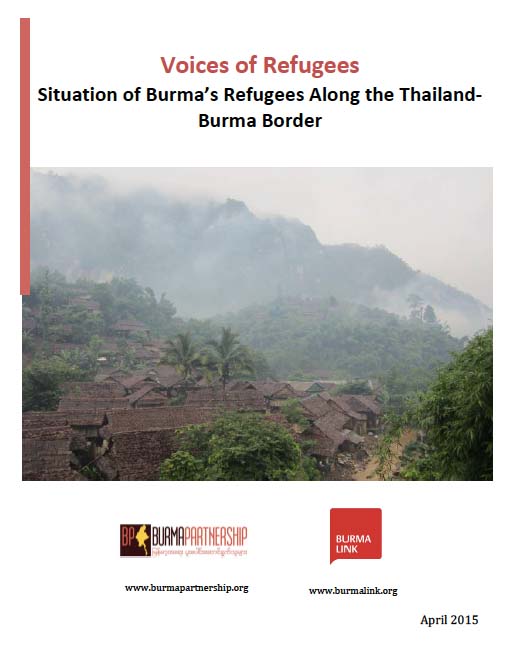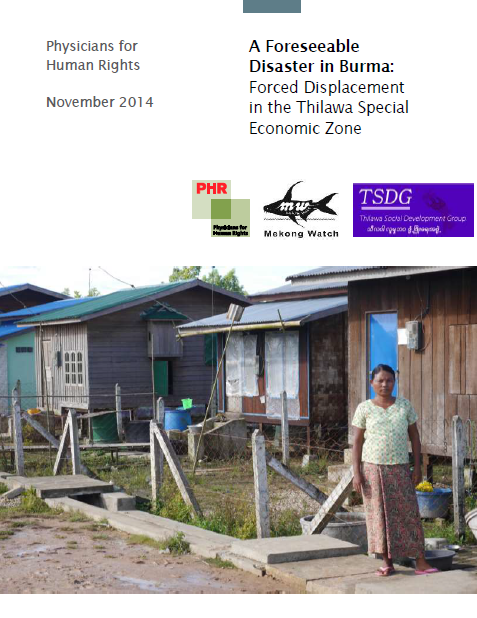Posts Tagged ‘Displacement’ (110 found)
Southeast Asia: Open Letter: Refugee Crisis
On 29 May 2015, Thailand is scheduled to host a Regional Summit on Irregular Migration in Bangkok to address the current refugee and migrant crisis in South East Asia, which has seen more than 2,000 people arrive by boat in Malaysia and Indonesia in May. According to the International Organization for Migration (IOM), thousands remain stranded at sea […]
• • •Briefing Paper: Voices of Refugees – Situation of Burma’s Refugees Along the Thailand-Burma Border
(27 April 2015) Today, Burma Link and Burma Partnership launches a joint briefing paper, Voices of Refugees – Situation of Burma’s Refugees Along the Thailand-Burma Border, online. The briefing paper highlights how the voices of refugees continue to be neglected in Burma’s reform process […]
• • •Voices of Refugees – Situation of Burma’s Refugees Along the Thailand-Burma Border
 The joint briefing paper by Burma Link and Burma Partnership, Voices of Refugees – Situation of Burma’s Refugees Along the Thailand-Burma Border, which was published online on 27 April 2015, highlights how the voices of refugees continue to be neglected in Burma’s reform process.
The joint briefing paper by Burma Link and Burma Partnership, Voices of Refugees – Situation of Burma’s Refugees Along the Thailand-Burma Border, which was published online on 27 April 2015, highlights how the voices of refugees continue to be neglected in Burma’s reform process.
The briefing paper was initially launched and presented by Soe Aung at the most recently convened Association of Southeast Asian Nations (ASEAN) Civil Society Conference/ASEAN Peoples’ Forum 2015 in Malaysia, which took place between 22-24 April 2015 […]
• • •Testimony to the House Committee on Foreign Affairs Subcommittee on Africa, Global Health, Global Human Rights, and International Organizations “Accountability and Transformation: Tier Rankings in the Fight against Human Trafficking”
Thank you, Chairman Smith, and other distinguished members of the Subcommittee for inviting me to testify at this important hearing on the U.S. State Department Trafficking in Persons (TIP) report and the tier-ranking process […]
• • •Open Letter to ASEAN Heads of State
We write as Members of Parliament representing several ASEAN nations to express our grave concern about the plight of Rohingya Muslims, the high risk of atrocities in Myanmar, and the dangers these crises represent, not only for Myanmar, but for the entire ASEAN region […]
• • •Burma: Amend Biased Citizenship Law
(New York) – The Burmese government should accept the United Nations call to amend the discriminatory law that deprives Rohingya Muslims of Burmese citizenship, Human Rights Watch said today in a letterto President Thein Sein.
On December 29, 2014, the UN General Assembly adopted a resolution calling on the Burmese government to amend the 1982 Citizenship Law so that it no longer discriminates against the Rohingya. Successive Burmese governments, including the current administration of Thein Sein, have used the law to deny citizenship to an estimated 800,000 to 1.3 million Rohingya by excluding them from the official list of 135 national races eligible for full citizenship […]
• • •Myanmar: Serious Risk of Further Human Rights Abuses at Controversial Letpadaung Mine
Two years after police used incendiary weapons against monks and villagers protesting a mining project in central Myanmar, no one has been held accountable, Amnesty International said ahead of the anniversary of the attack. […]
• • •Urgent Release: The Humanitarian Crisis Update and Key Messages for Kachin State and Northern Shan State
The Joint Strategy Team for Humanitarian Response in Kahcin and Northern Shan State would like to raise concerns over the recent increases of clashes and military actions near Laiza where over 17,000 IDPs are taking shelters in 4 camps. JST would like to request your urgent action and support for the safety and protection of the IDPs as well as ensuring unhindered and continuing humanitarian assistance for the IDPs in the KIO control area. […]
• • •Myanmar: A Tipping Point for Rohingya Rights?
 Two years after a wave of violence hit the region, Myanmar’s Rakhine State has become a segregated zone. Two million ethnic Rakhine live apart from 1.2 million stateless Rohingya, who are trapped inside displacement camps or barred from leaving their villages. Ending this segregation and protecting the rights of the Rohingya are necessary components of Myanmar’s move toward democracy. However, the Rakhine leadership has rejected – both politically and with force – any reintegration of the two communities, and it is seeking to exclude the Rohingya from any role in the state’s development, distribution of resources, and political representation. […]
Two years after a wave of violence hit the region, Myanmar’s Rakhine State has become a segregated zone. Two million ethnic Rakhine live apart from 1.2 million stateless Rohingya, who are trapped inside displacement camps or barred from leaving their villages. Ending this segregation and protecting the rights of the Rohingya are necessary components of Myanmar’s move toward democracy. However, the Rakhine leadership has rejected – both politically and with force – any reintegration of the two communities, and it is seeking to exclude the Rohingya from any role in the state’s development, distribution of resources, and political representation. […]
A Foreseeable Disaster in Burma: Forced Displacement in the Thilawa Special Economic Zone
Recent liberalization of some governmental policies in Burma (officially the Union of Myanmar) has led to the lifting of a number of bilateral sanctions and increases in foreign aid and investment. Both governments and corporations are entering into partnerships with Burmese companies to undertake major development projects, including building special economic zones (SEZ), developing hydroelectric dams, signing concession agreements for mining operations, and building pipelines. Despite their potential to create opportunities for economic advancement, such development projects are causing widespread forced displacement throughout the country, undermining the human rights of the people living in affected areas.
Forced displacement threatens people on every continent. Environmental degradation, conflict, the race for scarce resources, development projects, and land grabs have caused a significant number of these illegal displacements. People living in marginalized communities, including ethnic minorities and indigenous groups, are particularly vulnerable to forced displacement. […]
• • •









 All posts
All posts